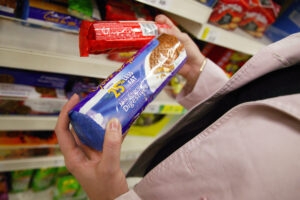News
Experts call for food labels to tell people how much exercise is needed to burn off snacks
30 Sept 2022
3m
Experts have sparked a criticism from an eating disorder charity after suggesting that food labels telling shoppers how much exercise is needed to burn off snacks should be rolled out nationwide.
Following a study by scientists at Loughborough University, researchers uncovered that labels with information such as “calories in this cake requires 90 minutes of walking to burn off” were understood much more easily than the current traffic light system.
The study spoke to more than 2,600 adults to obtain its results, and was presented at the International Congress on Obesity in Melbourne.

Food labels should show how to burn off calories, experts say (Credit: Alamy)
The scientists said that overall, 41 percent of participants found a system that measured calories as exercise would be easier to understand, in comparison to 27 percent who preferred the current traffic light method of labelling.
Chartered Psychologist Catherine Hallissey told Twisted: “I feel that this move towards pace labelling is a positive one. Many people do not fully understand energy labels on food.
“In addition, people tend to underestimate how much physical activity is needed to use up the calories they eat.”
Whilst she acknowledged that more research was needed into the impact on those with eating disorders, the expert added: “Labels that give an estimate of how much physical activity is required to burn off what they eat are easier to understand, meaning people can make much more informed decisions regarding whether it meets their nutritional needs.”
Also speaking to Twisted, Tom Quinn, eating disorder charity Beat’s Director of External Affairs, said that he believed the negatives of such a move would strongly outweigh these positives.
“Labelling food with the exercise needed to ‘burn off’ calories would be extremely damaging for people affected by eating disorders,” he explained.
“The misconception that all calories that are eaten must be cancelled out is very dangerous to the people we support, and we know it risks worsening harmful behaviours and thoughts for somebody who is unwell. It can also contribute to an eating disorder developing for someone who is already vulnerable.”
The research from the Loughborough University scientists reported that packaging warning how long it would take to walk off fatty and sugary foods was also more likely to capture people’s attention.

Eating disorder charities think that the idea could be dangerous (Credit: Pexels)
They used the example of a can of fizzy drink, which, at 150 calories, would take 30 minutes walking of 15 minutes of running to burn off, and a 209 calorie chocolate wafer biscuit, which would take 21 minutes of running or 11 minutes of walking.
The study was led by Loughborough’s professor of behaviour medicine, Amanda Daley, and found that the labelling – known officially as “physical activity calorie equivalent (pace) labelling” – was particularly popular amongst younger age groups.
The Professor said: “Nutritional labels support people to make food choices and traffic light labelling is the UK standard.
“However, many people do not understand the meaning of kilocalories (kcals or calories) or grams of fat displayed on food labels, and often underestimate the number of calories when labelling is not provided.”

The labels are being suggested on ‘treat’ food (Credit: Alamy)
The researchers went on: “Our findings highlight that pace labelling is a potentially important policy-based approach to strengthen current approaches to food labelling.
“The next steps are to test whether pace labelling reduces the purchases of high-calorie foods and drinks in different food settings such as restaurants, vending machines, coffee shops and pubs.”
In response to this, Beat’s Tom Quinn added that the new research failed to acknowledge that “health is complex, and cannot be determined purely by a person’s food intake or exercise.”
“To protect the 1.25 million people in the UK with an eating disorder, we strongly urge that policy makers do not implement exercise labels on food items, and that eating disorder clinicians and experts by experience are consulted during every stage of the process,” he concluded.



.png_67sCcN?tr=w-2560,f-webp,q-70)